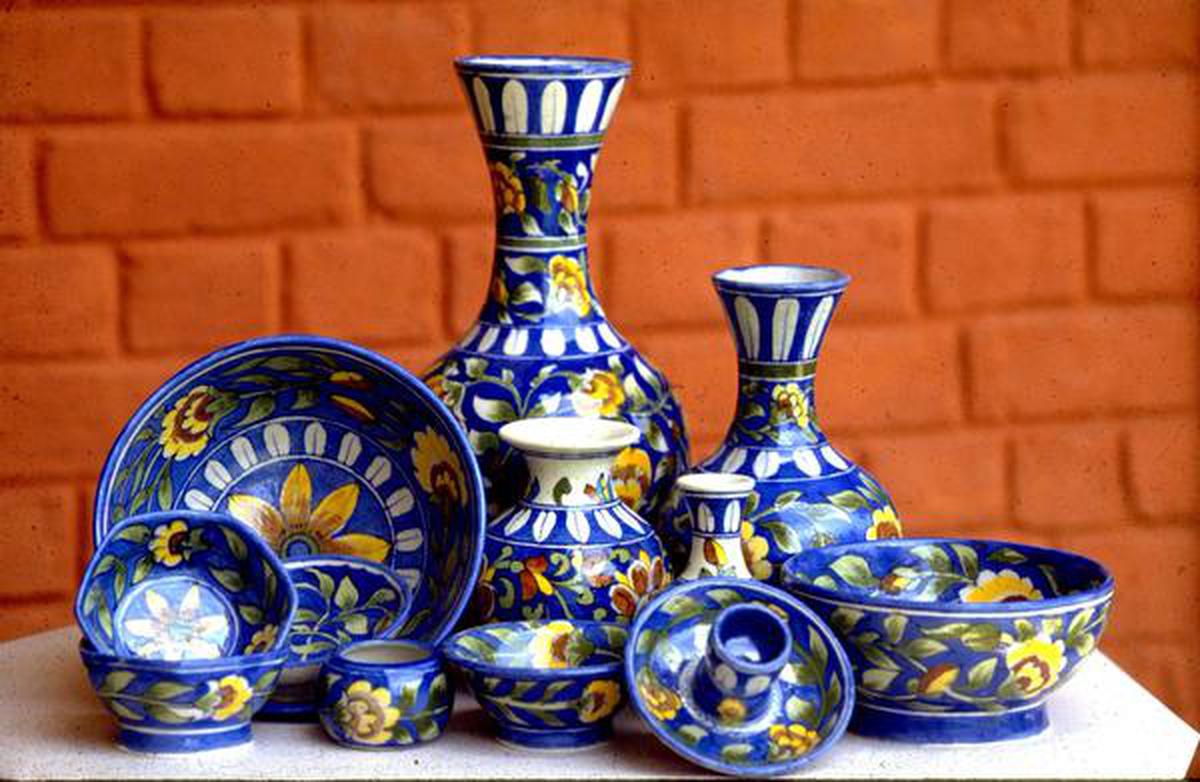Nestled in the heart of Rajasthan, the vibrant city of Jaipur is a tapestry of history, culture, and artistic brilliance. Among its many treasures, the art of Blue Pottery stands out as a testament to the city’s enduring craftsmanship and timeless allure.
Origins and Evolution
Blue Pottery, with its distinctive azure hues and intricate designs, has its origins in Persia. However, it found a new home in Jaipur during the 19th century, thanks to the visionary Maharaja Ram Singh II. Impressed by the elegance of this art form, he invited skilled Persian artisans to establish Blue Pottery in the royal court.
The craft quickly gained popularity and became an integral part of Jaipur’s cultural landscape. Over the years, Blue Pottery evolved, seamlessly blending Persian and Indian influences. The artisans of Jaipur infused the traditional craft with local motifs, geometric patterns, and vibrant colors, creating a unique and unmistakable aesthetic.
The Artisan’s Touch
At the heart of Jaipur’s Blue Pottery is the skilled hands of its artisans. Using a blend of quartz, raw glaze, and sodium sulfate, the craftsmen create a distinctive blue glaze that gives the pottery its name. The raw materials are meticulously mixed, shaped, and fired at a low temperature, resulting in the signature azure brilliance that distinguishes Jaipur’s Blue Pottery.
Artisans draw inspiration from nature, incorporating elements like flowers, birds, and geometric patterns into their designs. The meticulous hand-painting of these motifs requires precision and a deep understanding of the craft. Each piece tells a story, preserving the legacy of generations of artisans who have passed down their skills through the ages.
The Impact of Tradition
Blue Pottery is not just a craft; it is a living testament to Jaipur’s cultural heritage. The tradition has been passed down from master to apprentice, ensuring the preservation of techniques and the spirit of the art form. Families dedicated to Blue Pottery have played a crucial role in keeping the craft alive, fostering a sense of community and shared identity.
One of the remarkable aspects of Jaipur’s Blue Pottery is its adaptability. While staying true to its roots, the craft has embraced modern influences, attracting a diverse audience both nationally and internationally. From traditional plates and bowls to contemporary decorative pieces, Blue Pottery has evolved to meet the changing tastes of collectors and enthusiasts.
Challenges and Resilience
Despite its enduring popularity, Blue Pottery has faced challenges over the years. Mass production and the influx of cheaper alternatives have posed threats to the traditional craftsmanship. However, the resilience of Jaipur’s artisans and their commitment to preserving the authenticity of Blue Pottery have ensured its survival.
Efforts by the government and various organizations to promote and protect traditional crafts have played a crucial role in sustaining Blue Pottery. Initiatives to provide training, financial support, and a platform for artisans have contributed to the continued vibrancy of this cherished art form.
Preserving the Legacy
In recent times, there has been a renewed appreciation for handmade and traditional crafts, fueling a resurgence of interest in Blue Pottery. Artisan cooperatives and exhibitions have provided a platform for craftsmen to showcase their skills, fostering a deeper connection between the creators and the appreciators of this timeless art.
As visitors explore the bustling markets of Jaipur, they are greeted by a kaleidoscope of Blue Pottery—from intricately designed vases to delicate tea sets. Each piece tells a story of tradition, craftsmanship, and the vibrant spirit of Rajasthan.
Jaipur’s Blue Pottery is not merely an art form; it is a living legacy that continues to captivate hearts and minds. As it weaves through the fabric of Jaipur’s history, this craft stands as a symbol of resilience, adaptation, and the enduring beauty of tradition. In a world where mass production often overshadows handmade treasures, the artisans of Jaipur persist in creating pieces that transcend time, inviting us to appreciate the beauty that lies in the hands of those who craft with pas























